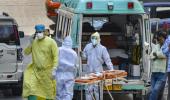On April 10, the Union health ministry praised the 'Agra Model' for fighting the coronavirus pandemic.
On April 27, the city reported 32 hotsposts and 365 confirmed COVID-19 cases.
Syed Firdaus Ashraf reports.

A fortnight ago the 'Agra model' was touted as something the rest of India battling the coronavirus pandemic ought to follow.
On April 12, Bharatiya Janata Party spokesperson Sambit Patra, a doctor by training, quoting a news report, tweeted, 'The #Agramodel in Uttar Pradesh to fight COVID has emerged as a success story which should be emulated by other states as best practices'.
Just 10 days later, Agra Mayor Naveen Jain wrote to Uttar Pradesh Chief Minister Yogi Adityanath stating that if action is not taken soon, then Agra would become the 'Wuhan of India'.
How did the the situation in Agra change so drastically within less than a fortnight?
On March 3, 2020, Air India tweeted from its official handle stating, 'This is for the attention of passengers who flew on A1154 Vienna-Delhi on 25th February 2020. One of the passengers has tested positive for #coronavirus. Please follow the protocol notified by the ministry of health regarding coronavirus'.
The COVID-19 passenger in question, Agra's Patient Zero, had travelled from Italy to Vienna by road and then took the Air India flight to New Delhi.
What Air India did not know while putting out the information on Twitter was that the passenger had already travelled to different places after arriving in New Delhi.
And that included Agra, where he met relatives.
The same day, March 3, 2020, Prime Minister Narendra Damodardas Modi tweeted, 'There is no need to panic. We need to work together, take small yet important measures to ensure self-protection'.
Modi's tweet added: 'Had an extensive review regarding preparedness on the COVID-19 Novel Coronavirus. Different ministries & states are working together, from screening people arriving in India to providing prompt medical attention'.
It was already too late as far as Agra was concerned as six people this COVID-19 patient met in the city had already tested positive.
The same night, the Agra district magistrate tweeted information on coronavirus, including how it spreads, what precautions need to be taken and shared important phone numbers in case of an emergency.
If that was not a bad start for Agra, a week later came the news that a Google employee's wife who had tested COVID-19 positive in Bengaluru had left a quarantine centre to take a flight to Delhi and then took a train to reach Agra, where she was at her parent's home.
The couple had travelled to Italy for their honeymoon in February where the wife was infected with the disease.
Even as the police filed a first information report against her and her family for not cooperating with the authorities and hiding her travel history, all was still not lost.
As of March 18 as there were only seven COVID-19 patients in Agra.
But things changed on March 26 after a kidney patient admitted to a hospital in the city was found to be positive. One of the cleaning staff contacted the virus from the patient and in turn spread the virus to eight of her family members.
According to a report (external link) published in The Hindu. Dr R M Pachori, district president of the Indian Medical Association in Agra was quoted as saying, 'This patient turned out to be a contact person of a person who attended a religious congregation in New Delhi.'
Till April 3, 2020, there were 12 COVID-19 patients in Agra, with eight of them being discharged after testing negative for the virus.
Until then 1,145 tests had been conducted by the authorities in Agra.
Later, five men who attended the Tablighi Jamat congregation in New Delhi tested positive in Agra.
On April 9, from these five cases 14 new COVID-19 patients were traced.
On April 10, the number rose almost four times, with 80 COVID-19 patients in Agra and 33 hotspots detected across the city.
To fight the COVID-19 battle, 1,200 workers conducted house to house testing. Over 900,000 people were screened in a short span of time.
It was here that the Union health ministry stepped in and praised the 'Agra model', stating how it was the first city in India to fight the coronavirus with a cluster model and that the rest of India must follow it.
But 10 days later, the number of COVID-19 patients went up drastically in Agra and the situation seemed to be going out of control.
On April 18, Agra District Magistrate Prabhu Singh tweeted that there were now 223 active cases in the city.
Singh was unavailable when this correspondent tried to contact him and did not respond to messages.
Three days later, Agra Mayor Naveen Jain's letter to Chief Minister Adityanath was leaked to the media in which Jain said that many people were dying because of no treatment and if the situation is not managed properly then Agra 'may resemble Wuhan city of China', the epicentre of the global coronavirus pandemic.
'No testing is taking place in quarantine centres set up by the local administration in coronavirus hotspots. No arrangements have been made for food and water to patients,' Jain's letter to Adityanath stated.
'In government hospitals, care is not being provided to patients having other diseases. Many are dying because of no treatment. Private hospitals are merely carrying out paperwork and nothing is happening on the ground,' Jain said.
'The authorities in Agra are only coming out of their homes for 20 minutes in a day to show their faces. They only come for photo clicking to show that they are working, but they are not,' Jain alleged.
'And if the coronavirus situation is not managed properly,' Jain warned. 'then Agra may resemble Wuhan city of China, the epicentre of Coronavirus.'
Congress leader Priyanka Gandhi Vadra tweeted the leaked letter and advised the UP government to do more testing and save the people of Agra.
If the leaked letter was not enough to highlight the grim situation in the city, an unverified video from Agra was leaked on social media where COVID-19 patients were shown begging for food and water and district officials were throwing these items to the patients.
When this correspondent contacted Agra Mayor Jain, he said, "The situation in Agra is improving and things are in control."
Asked about his letter stating that Agra was turning into a Wuhan, Jain downplayed his statement.
"I wrote that letter on April 21 and things have come under control now. It has been six days now. Chief Minister Adityanath has controlled the situation very well now," Jain said.
When asked about the current situation in Agra, Jain said, "Whatever the condition of India is, the condition of Agra is. No different."
The mayor refused to speak further and said Dr Mukesh Vats, Agra's chief medical officer, was the person to speak to.
"At present," said Dr Vats, "380 cases of COVID-19 positive are in Agra and the hotspot areas are under control. I am hopeful there will be more improvement soon."
"There were 33 hotspot areas for COVID-19, but now three of them are out of it so the figure has come down to 30," he added.
Dr Vats refused to accept that the much-lauded Agra model was crumbling.
"The Agra model was successful because of karyashaili (work technique), it was not for (low) number of cases. The number of cases is not in our hand as it can increase but we are controlling it well," Agra's chief medical officer said.
"What succeeded in Agra was the cluster model and how we contained the cases with that," Dr Vats explained. "That became a symbol, a model for all over the country as this was the first time it had happened in India."
Asked what went into the Agra model, Dr Vats said, "We did house to house survey within 3 km of a positive case, had a contact tracing team, did sanitisation and training of people."
On April 27, District Magistrate Prabhu Singh tweeted the list of hotspot areas in Agra. According to him, there were now 32 hotsposts in the city with 365 confirmed COVID-19 cases.










